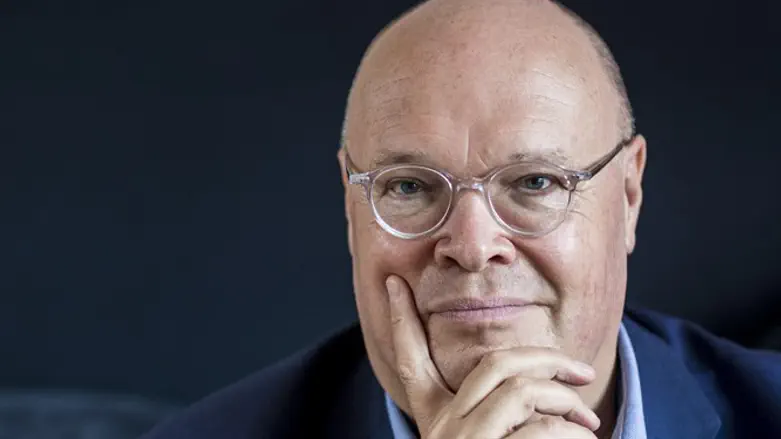
"In 2008 I became the Director of what was then called the 'Joodse Omroep' (JO), a Jewish broadcaster of radio and TV programs. I aimed to serve two purposes: first to create programs on behalf of the Jewish community in the Netherlands whose population numbers between 30,000 – 35,000 people.
“Furthermmore we wanted to inform the Dutch at large about culture, religion and history relating to the Jewish people. It was also our approach to ensure that our programs always had a relationship to the Netherlands."
Born in 1957, Alfred Edelstein studied journalism. He had a varied career in this field. Only when he was around 18 years old his father told him that he was Jewish from his paternal side.
"In 2010 our program regarding the issue of wearing kippot in public had a large impact. Then Amsterdam Rabbi Lody van der Kamp visited various Amsterdam neighborhoods accompanied by a number of Jewish youngsters wearing kippot --.
“This had unpleasant consequences in a number of neighborhoods. In the town’s Western part they encountered aggressive reactions and were scolded by young people of Mediterranean origin. It was a shocking broadcast. As a result, some of our viewers began to recognize antisemitism as a problem in the Netherlands.
"Toward the end of our independent existence in 2015, we made a documentary entitled Little Angels. It centered on a 93 year old Dutch Holocaust survivor. She left the Netherlands in 1946 to try to rebuild her life in the United States. As her husband and 2 young daughters had been murdered, she felt that she could no longer remain in Amsterdam.
"It was a very moving documentary. It made clear that the consequences of the Shoah have an everlasting effect. This documentary received the prestigious Prix Europa award in Berlin. It was a major achievement for a small broadcaster."
"The second Dutch government of Prime Minister Mark Rutte decided to eliminate small independent broadcasting companies by the end of 2015. We could however become part of a bigger broadcaster, but were no longer allowed to broadcast radio programs.
"We chose to merge with the Evangelical Broadcasting Company (EO). The EO had a great deal of respect for Judaism and Israel and we could not have found a better home. No longer a legal entity, we were a Jewish editorial department within the EO. They gave us a great deal of freedom over our work.
"Our goals have remained unchanged. Our budget is in the region of about 800,000 Euros per year. We are obligated to produce 23 hours of television annually. We supplement this by repeating broadcasts and purchasing outside programs.
"Within the new set up, a three-part program in 2016, The Canary in the Coal Mine, was one of our most important projects. This program dealt with contemporary antisemitism in the Netherlands, France and England. We received many reactions - the most notable can be summarized as: "We never knew that the situation was so serious." The program was presented by the well-known Jewish TV journalist, Hanneke Groenteman."
"At the beginning of the first part, Groenteman said: 'I have heard sometimes about antisemitism, it isn't very nice but I haven't experienced it.' “At the end of the first part, she concluded almost crying, that it is a horrible subject. The program helped to show non-Jewish viewers the extent of antisemitism, a subject one hears relatively little about in the Netherlands. Many people then realized that this is a very serious societal phenomenon.
"Racism is the worst thing that can occur in the Netherlands. This is true for many Western societies. Antisemitism, on the other hand, is barely regarded. After viewing the first part of this documentary it was no longer possible to ignore the impact of antisemitism. The series led to antisemitic reactions, both by email and regular mail.
"We treat Israel like any other topic. In 2017, on the occasion of the 50th memorial day of the Six Day War, we produced a three part series: Why I am here - A Jewish Filmmaker and the Israeli Issue. Created by Marcel Prins, who looked back with individuals involved with the creation of the Jewish state in 1948 and its developments thereafter. The series received approximately 300,000 viewers, a remarkable number for a film of this type. We received many reactions. Those from Jews varied greatly. This also holds true for non-Jewish reactions including crazy antisemitic conspiracy theories.
"Judaism and the Jewish community still have a very important symbolic function in the Netherlands. This contrasts with the fact that there are so few Jews. The aforementioned subjects relate to this."
Edelstein concludes: "I am a very involved observer. I could never observe so fundamentally and with so much motivation if this didn't include a personal element. My profession has enabled me to explore Judaism and its wealth in many areas in such a profound way."
